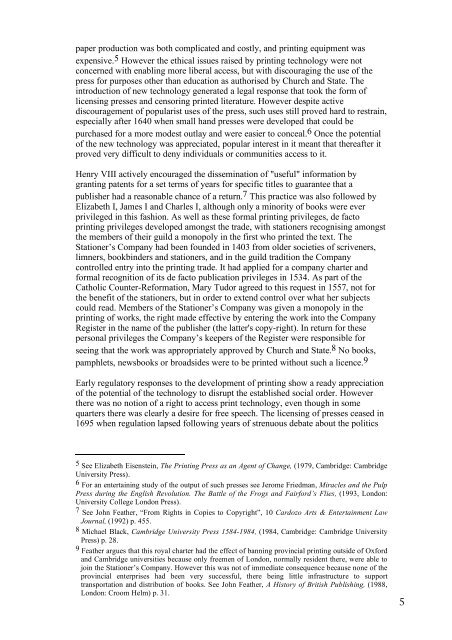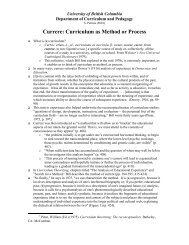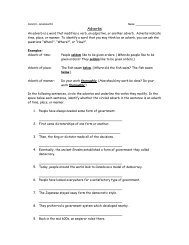ETHICAL BOUNDARIES AND INTERNET CULTURES
ETHICAL BOUNDARIES AND INTERNET CULTURES
ETHICAL BOUNDARIES AND INTERNET CULTURES
You also want an ePaper? Increase the reach of your titles
YUMPU automatically turns print PDFs into web optimized ePapers that Google loves.
paper production was both complicated and costly, and printing equipment was<br />
expensive. 5 However the ethical issues raised by printing technology were not<br />
concerned with enabling more liberal access, but with discouraging the use of the<br />
press for purposes other than education as authorised by Church and State. The<br />
introduction of new technology generated a legal response that took the form of<br />
licensing presses and censoring printed literature. However despite active<br />
discouragement of popularist uses of the press, such uses still proved hard to restrain,<br />
especially after 1640 when small hand presses were developed that could be<br />
purchased for a more modest outlay and were easier to conceal. 6 Once the potential<br />
of the new technology was appreciated, popular interest in it meant that thereafter it<br />
proved very difficult to deny individuals or communities access to it.<br />
Henry VIII actively encouraged the dissemination of "useful" information by<br />
granting patents for a set terms of years for specific titles to guarantee that a<br />
publisher had a reasonable chance of a return. 7 This practice was also followed by<br />
Elizabeth I, James I and Charles I, although only a minority of books were ever<br />
privileged in this fashion. As well as these formal printing privileges, de facto<br />
printing privileges developed amongst the trade, with stationers recognising amongst<br />
the members of their guild a monopoly in the first who printed the text. The<br />
Stationer’s Company had been founded in 1403 from older societies of scriveners,<br />
limners, bookbinders and stationers, and in the guild tradition the Company<br />
controlled entry into the printing trade. It had applied for a company charter and<br />
formal recognition of its de facto publication privileges in 1534. As part of the<br />
Catholic Counter-Reformation, Mary Tudor agreed to this request in 1557, not for<br />
the benefit of the stationers, but in order to extend control over what her subjects<br />
could read. Members of the Stationer’s Company was given a monopoly in the<br />
printing of works, the right made effective by entering the work into the Company<br />
Register in the name of the publisher (the latter's copy-right). In return for these<br />
personal privileges the Company’s keepers of the Register were responsible for<br />
seeing that the work was appropriately approved by Church and State. 8 No books,<br />
pamphlets, newsbooks or broadsides were to be printed without such a licence. 9<br />
Early regulatory responses to the development of printing show a ready appreciation<br />
of the potential of the technology to disrupt the established social order. However<br />
there was no notion of a right to access print technology, even though in some<br />
quarters there was clearly a desire for free speech. The licensing of presses ceased in<br />
1695 when regulation lapsed following years of strenuous debate about the politics<br />
5 See Elizabeth Eisenstein, The Printing Press as an Agent of Change, (1979, Cambridge: Cambridge<br />
University Press).<br />
6 For an entertaining study of the output of such presses see Jerome Friedman, Miracles and the Pulp<br />
Press during the English Revolution. The Battle of the Frogs and Fairford’s Flies, (1993, London:<br />
University College London Press).<br />
7 See John Feather, “From Rights in Copies to Copyright”, 10 Cardozo Arts & Entertainment Law<br />
Journal, (1992) p. 455.<br />
8 Michael Black, Cambridge University Press 1584-1984, (1984, Cambridge: Cambridge University<br />
Press) p. 28.<br />
9 Feather argues that this royal charter had the effect of banning provincial printing outside of Oxford<br />
and Cambridge universities because only freemen of London, normally resident there, were able to<br />
join the Stationer’s Company. However this was not of immediate consequence because none of the<br />
provincial enterprises had been very successful, there being little infrastructure to support<br />
transportation and distribution of books. See John Feather, A History of British Publishing, (1988,<br />
London: Croom Helm) p. 31.<br />
5

















